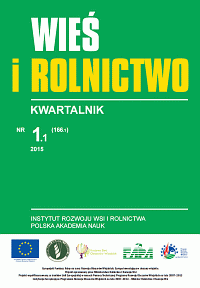Rolnicy i spółdzielczość w Polsce: stary czy nowy ruch społeczny?
Farmers and the cooperative movement in Poland: an old or a new social phenomenon?
Author(s): Piotr Nowak, Krzysztof GorlachSubject(s): Economy
Published by: Instytut Rozwoju Wsi i Rolnictwa Polskiej Akademii Nauk
Keywords: agricultural cooperatives; old and new social movements; rural development; barriers of cooperatives` development; spółdzielczość w rolnictwie; nowe ruchy społeczne; rozwój obszarów wiejskich; bariery rozwoju spółdzielczości
Summary/Abstract: The article presents contemporary Polish farmers’ attitudes towards the concepts of cooperatives. The authors claim that current attitudes have resulted from the historical experience of Polish rural and agricultural population as well as from the current context of a contemporary neo-liberal capitalist economy. The article is divided into four parts. The first one provides a synthetic history of the cooperative movement. The author stresses that the beginning of Polish cooperative movement originates in a period of partition (before World War I). In the interwar period (1918–1939) cooperative organizations became an example of a dynamic development of social and economic initiatives in Poland including rural areas. After World War II, during a communist period, the cooperative movement has been used by political and administrative authorities as a tool for domination and control of various economic and social initiatives. The second part of the article provides a short history and analysis of the evolution of the cooperative movement in a contemporary world with stress of its growing similarity to various organizational forms of socio-economic activities in a neo-liberal, global, and capitalist economy. The third part present results of a research program conducted by Centrum Doradztwa Rolniczego (Central Agricultural Advisory Service) in Krakow within the framework of a project on “Cooperatives in opinions of farmers and extension advisers and the role of cooperatives in the development of entrepreneurship in rural areas”. This Polish research was conducted between October and November 2013 in the form of a survey of 2525 farmers who cooperate with extension advisers. The final part of the article presents conclusions. These include the skeptical attitudes towards the idea of cooperatives found among older farmers result from their negative experience rooted in the communist period. It also presents that young farmers (below 35) have a poor level of knowledge about cooperatives but, at the same time, they are highly interested in using cooperatives as a tool of defending their economic interests, i.e. they treat cooperative movements as a more “old social movement” phenomenon, quite contrary to “new social movement” one that has been focused more on post-materialist values. The conclusions also formulate that only 25% of respondents formulated the opinion that farmers and other rural dwellers are inclined to participate in collective activities. This tendency results from a low level of general trust that characterises Polish society. Artykuł jest próbą ukazania postaw współczesnych polskich rolników w odniesieniu do idei spółdzielczości. Autorzy przyjmują założenie, że postawy te są zdeterminowane zarówno historycznymi doświadczeniami mieszkańców wsi polskiej, jak i współczesnym funkcjonowaniem neoliberalnej rynkowej gospodarki kapitalistycznej.
Journal: Wieś i Rolnictwo
- Issue Year: 166/2015
- Issue No: 1(1)
- Page Range: 131-154
- Page Count: 24
- Language: Polish

